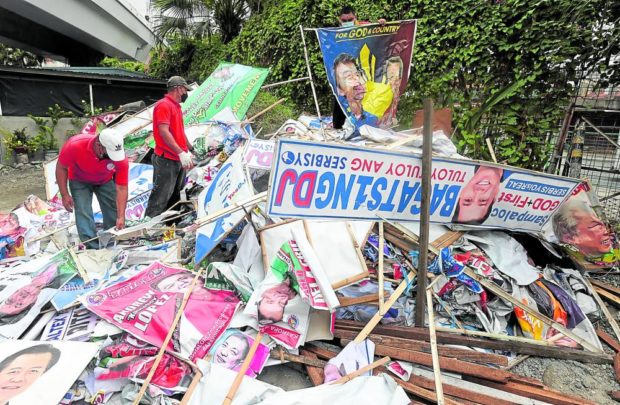
HAUL | Workers of the Metropolitan Manila Development Authority prepare to haul a pile of campaign materials taken down along the stretch of Espana Boulevard in Manila on
Feb. 18, 2022, as the Commission on Elections starts “Oplan Baklas.” (Photo by MARIANNE BERMUDEZ / Philippine Daily Inquirer)
MANILA, Philippines — “Advocacy” materials posted within someone’s private property would not be taken down even if these mention the names of political candidates, James Jimenez, spokesperson of the Commission on Elections (Comelec) announced on Monday.
“For example, you commissioned your own banner and expressed your own advocacy and in the process, you mentioned the name of the candidate. This could be allowed to pass because this is your advocacy,” Jimenez said at the Laging Handa briefing.
“But if you will only use a poster given by the campaign or you printed the design of the campaign [material] and did not add anything to it, then that is just an ordinary campaign material. And based on our interpretation of Supreme Court jurisprudence, this [is simple political campaigning and] could be regulated,” he added.
The poll body has recently drawn flak for its “Oplan Baklas” operation that targets improper election paraphernalia, particularly oversized posters, even if these are on private property.
The controversy prompted veteran election lawyer Romulo Macalintal to say in a statement that the Comelec had no power to remove such materials posted by noncandidates within their property, even if these did not confirm with the prescribed size, “without notice and hearing or without giving them the opportunity to be heard.”
Supporters of Vice President Leni Robredo were among those who complained about the removal of the campaign materials they had put up in their own properties. These included a mural of the presidential aspirant in Isabela province which an election official had ordered to be painted over for being “prohibited propaganda material.”
Murals not covered
Jimenez, however, later admitted in a TV interview that murals were technically not covered by the implementing rules and regulations of the Fair Election Act.
Macalintal, a member of Robredo’s legal team, also called on the Comelec to postpone its implementation of Oplan Baklas while it was conducting a review of the rules on its implementation.
Jimenez said that the poll body was willing to listen or receive position papers on a different interpretation of the rules.
“With regard to [Oplan] Baklas, it will continue, of course. The entire [operation] is not controversial, only those that involved private property. But for those on the streets, public places, those installed on power lines, we would continue to remove those,” he added.
Those opposed to the campaign should let the Comelec know their views, according to Jimenez.
“If there are those who would provide a contrary opinion or different interpretations of the policies or if they have observations they want to show the Comelec, then we are willing to accept these written position papers,” he said.
The filing of complaints in connection with Oplan Baklas is also welcome. “They could pursue it so that the issue could be made clear,” Jimenez said.
As for the poll body, it has yet to file any case in connection with illegally posted campaign materials. Jimenez said they would first need to send notices to the concerned parties.
He warned that candidates who allow illegal campaign materials to be put up could be held accountable with imprisonment of up to six years, fines and possible disqualification from holding public office among the possible penalties.
RELATED STORIES
Comelec on candidates planning to file case after Oplan Baklas: ‘Mas maganda ‘yun’
Postpone ‘Oplan Baklas’ – election laywer to Comelec
Murals ‘technically not included’ in ‘Oplan Baklas’ guidelines – Comelec exec